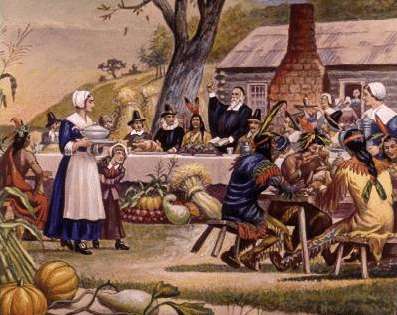True Pilgrims, True Thanksgiving

Once again, the Thanksgiving holiday is upon us and our minds are filled with images of pilgrims and pumpkin pie. All across our nation it is a time of family gatherings, feasting, and football. Such celebration can be good and godly, but it can best be these things if we remember the holiday’s origins and truly enter into the spirit of giving thanks. The pilgrims have much to teach us about thanksgiving.
Who were these people we know as the pilgrims? They were Puritans who felt conscience-bound to separate from the Church of England when that church in 1604 demanded strict conformity to the Book of Common Prayer in worship. These Puritans longed for a more thoroughgoing Reformation in order to worship only in ways clearly mandated in Scripture. At first, they worshiped secretly in homes in England, but persecution was on the rise. One such group in the town of Scrooby soon realized that they would have to leave the country in order to worship freely. They went first to Holland, but troubles there signaled time for another move. When the Mayflower set sail for America in 1620, 37 of its 102 passengers were Puritan Separatists from Scrooby that had settled in Holland. Many in the community stayed behind in Holland with their pastor, John Robinson, intending to join their friends and loved ones in America later on.
The two-month trans-Atlantic voyage was often rough and miserable, and things only got worse when they reached the New World in November. They began building their settlement in the midst of a deadly winter, through which only 55 of the 102 passengers survived. Eight children who had come with at least one parent now had none. Of 18 adult women, only four survived. Many reunions planned with those left behind in Holland would now take place only in heaven. It was a bitter beginning.
Spring and summer brought a peace treaty with the Indians, who helped teach the settlers how to farm in the New World. Crops were limited but sufficient for survival when combined with the fruits of foraging and hunting. When the harvest came in, there was a three-day celebration by about 50 settlers and 90 native Americans. It was a time of feasting, recreation, and giving thanks to God for the blessings of the harvest. This celebration is commemorated by our Thanksgiving holiday.
How was it that these settlers could be so thankful after all the tragic losses of the previous year? I suggest it was because they were true pilgrims. They didn’t generally refer to themselves in this way. The closest they came to doing so is a statement by William Bradford in his book, Of Plymouth Plantation:
So they left that goodly and pleasant city [Leyden in Holland] which had been their resting place near twelve years; but they knew they were pilgrims, and looked not much on those things, but lift up their eyes to heaven, their dearest country, and quieted their spirits.
This language echoes that of Hebrews 11.13-14, which speaks of believers as “strangers and pilgrims on the earth” who “seek a [heavenly] homeland.” The Separatists from Scrooby were pilgrims in the same way Bunyan’s character, Christian, was a pilgrim. They were pilgrims on earth making their way to the Celestial City. That eternal perspective made it possible for them to experience such great sorrow through the winter and yet emerge thankful for the good things God gave to them.
If we would celebrate Thanksgiving in the spirit of these early settlers, we also should cultivate an identity as pilgrims on earth making our way to the heavenly city. When sorrows come to us, we can know that God is with us in them and that they will not last forever. We can give Him thanks for every good gift He sends our way.
When you gather with your family and friends on Thanksgiving Day, remember these pilgrims and their harvest feast of celebration before God. Review the past year with its blessings and hardships, and reflect on God’s faithfulness to you in it. Offer sincere and specific prayers of thanksgiving to the Lord who is leading you on your pilgrimage. And then, like those pilgrims of old, enjoy the feasting and fun that should characterize your Christian faith.
